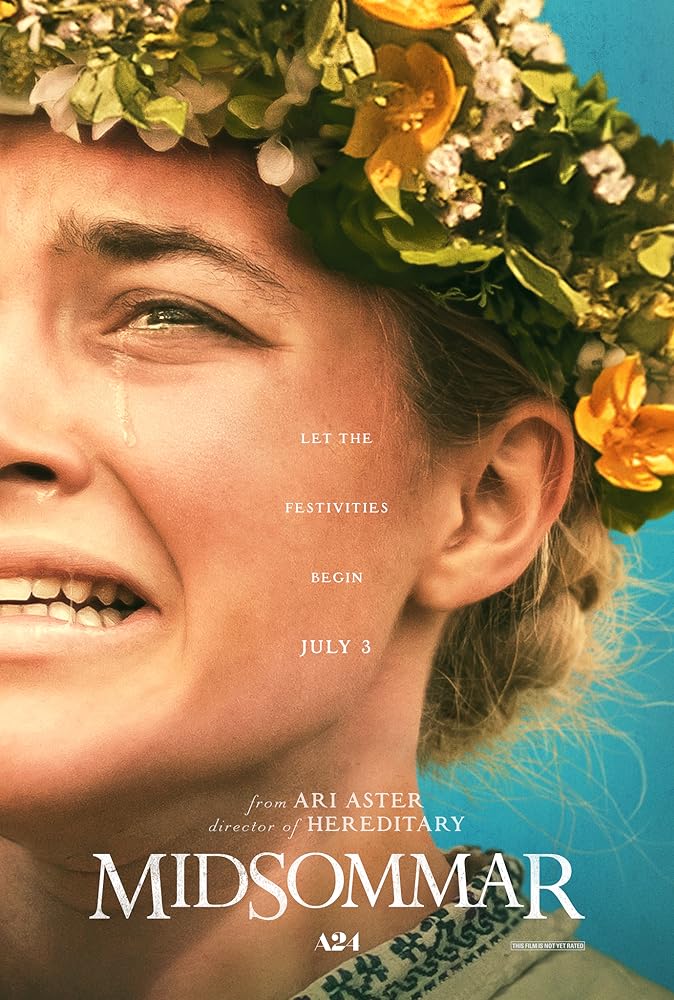
Hereditary
was my favorite movie of last year, cementing itself as a modern horror
masterpiece and introducing writer/director Ari Aster as an extremely promising
new talent. Even a year later, it never ceases to leave me feeling like I’m
smothered in a blanket of dread, not by scaring us with spooky ghosts or
bloodthirsty serial killers, but by presenting the foundations of psychological
trauma onscreen in an uncomfortably real manner. Some of the people I’ve talked
to who didn’t like this movie claim it all fell apart for them when the ending
revealed that everyone was being manipulated by a cult when the vicious cycle
of abuse that was tearing the family apart was sufficient enough. Midsommar,
Aster’s highly anticipated follow-up, seems designed to piss those people off
by bringing the cult elements to the foreground, but is no less effective.
Our story follows Dani (Florence Pugh), a troubled college
student who just suffered a tremendous loss that leaves her all alone in the
world. The only one she has to lean on is her emotionally distant boyfriend
Christian (Jack Reynor), who was contemplating breaking up with her before the
sudden tragedy put that plan on hold. That summer, Dani invites herself to join
Christian and his friends on a trip to a remote commune in Sweden. It’s a
special occasion, as they are celebrating a sacred festival that only occurs once
every ninety years. The disarmingly pleasant villagers are thrilled to have
these outsiders in their midst, but when their customs
and rituals become too much to handle, old wounds are ripped open and Dani is
forced to relive her trauma all over again.
If you’ve seen Hereditary, then you know Ari Aster
loves to defy expectations of what you can and can’t do in a horror movie. Like
his previous film, Midsommar is more of a personal drama in horror’s
clothing, where the heroine must wrestle with tremendous amounts of grief and
inner turmoil, while also dealing with a pagan cult whose barbaric customs are
tethered to a strong sense of community and tradition that would seem
incredibly inviting to someone in her predicament. But even then, the horror
elements are nothing short of high-octane nightmare fuel. Where Hereditary
broke the rules by misdirecting the audience’s expectations, Midsommar
does so by being shot almost entirely in broad daylight. Aster uses light in
this movie the same way Picasso used light in Guernica, with its most transgressive
moments happening in vivid detail under the voyeuristic eye of the sun.
Midsommar is one of those movies that hinges on the
main cast sticking around long after anyone else would’ve gotten the hell out
of dodge. From their first arrival, there are several instances that should’ve
been a red flag to any sensible person (accepting drugs from someone they met
less than a minute ago, watching a ritualistic suicide, being selected as the
recipient of a “love potion” etc.), but they try to play along as if they’re
not traumatized by what they witness, brushing it off as cultural norms better
left unquestioned. But our main characters don’t hightail it out of there or
point out the craziness for reasons beyond being miles away from civilization.
Josh (William Jackson Harper) is there to study the festival for his college
thesis (with Christian later attempting to piggyback off of his work). Mark
(Will Poulter), who tagged along hoping it would be a bachelor getaway, stays
for the feint promise that he’ll eventually get laid. And Dani… well, much like
her rickety relationship with Christian constantly on the verge of collapse,
it’s complicated.
Aster has insisted multiple times that this is a break-up
movie, and the final result has as much to do with Blue Valentine as it
does with The Wicker Man, even if it’s not immediately apparent. Much
like how half the horror of Hereditary was watching this family tear itself
apart and leaving you to wonder if it was their own doing or that of outside
forces, Midsommar’s sense of dread is derived from watching Dani and
Christian stay in a relationship that isn’t toxic per se, but clearly isn’t
beneficial to either party. The madness of their sedentary status is
externalized by the madness of the cult. One reason they don’t initially speak
out against all the craziness around them is to avoid coming off as culturally
insensitive, and as we see, stepping over cultural boundaries, whether intentional
or not, has dire consequences. Likewise, Dani and Christian know their
relationship is on equally rickety footing and know one misstep will send them
tumbling down with it. When the festivities and search for catharsis come to
their inevitable collision, the prospect soon becomes too much to bear.
Bottom line, Midsommar is a deranged, expertly
crafted creepfest that showcases Aster’s knack for merging fantastical genre
with dark realism in an astonishingly visceral manner. For me it was more unsettling
than it was scary, never reaching the harrowing depths of despair that Hereditary
plunged headfirst into, and at two hours and twenty minutes, it can feel a
bit unwieldy in places. But if you’re the kind of person who’s suspicious of
overly happy people, or experienced isolation in the wake of grief, then this
movie was tailor made to reinforce those fears.
9/10
No comments:
Post a Comment